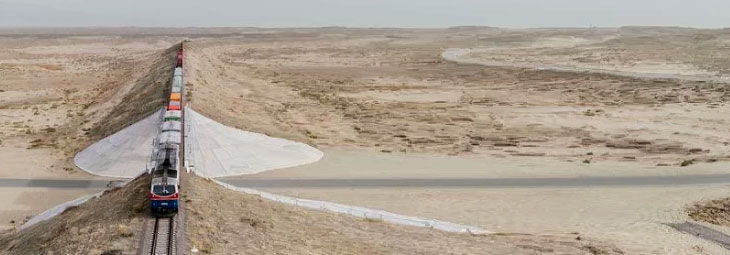



Photo taken on Dec. 8, 2021 shows wind turbines at Changma wind farm in Yumen City, northwest China's Gansu Province. (Xinhua/Fan Peishen)
BEIJING, Sept. 24 (Xinhua) -- China is strengthening its efforts to push forward global development, addressing fundamental issues such as poverty, healthcare and climate change in an era of unsettling challenges and uncertainties.
By pooling strengths from across the world through multilateral cooperation mechanisms and initiatives such as the Global Development Initiative (GDI), China is seeking international cooperation to achieve the United Nations Sustainable Development Goals (SDGs)。
POVERTY ALLEVIATION
Eliminating poverty is the common aspiration of all people across the world, and a shared mission of the international community. The first goal of the SDGs is to "end poverty in all its forms everywhere."
China achieved its goal of eradicating absolute poverty as scheduled, improving the living standards of hundreds of millions of people through decades of hard work.
Over the past 40 years, China has contributed close to three-quarters of the global reduction in the number of people living in extreme poverty, according to a joint report released in April by China's Ministry of Finance, the Development Research Center of the State Council, and the World Bank.
As the world's most populous country forges ahead toward its rural revitalization goal, it is sharing its valuable experience in fighting poverty with other developing countries.
In Laos, Myanmar and Cambodia, China has launched pilot projects to improve the organizational abilities of local villages, encourage farmers to combine their efforts through agricultural activities, and cultivate a new vision for development to shake off poverty, according to a white paper titled "China's International Development Cooperation in the New Era," issued by the State Council Information Office in 2021.
China has also organized training programs and co-hosted seminars with the United Nations Industrial Development Organization to share ideas and actions for targeted poverty alleviation with other developing countries, the white paper stated.
ENHANCING HEALTHCARE
China has always emphasized putting people and their lives first, and has been actively assisting developing countries to improve their public health systems and medical services.
From 2015 to 2019, China dispatched 3,588 medical workers overseas in 202 groups, and they in turn provided treatment to 11 million patients, organized professional training for local medical workers, offered free mobile clinic services, and donated medicines and equipment, according to the white paper.
After the outbreak of COVID-19, China continuously offered vaccine aid and medical support to less developed countries.
As of Aug. 23, China has provided 189 million doses of COVID-19 vaccines to 27 African countries since the Eighth Ministerial Conference of the Forum on China-Africa Cooperation in November 2021. Localized annual production capacities, in cooperation with African partners, now total nearly 400 million doses.
By 2030, China will have sent 5,000 professionals from the China Medical Team to other developing countries in need to help build up their infectious disease response and medical treatment capacities, according to the deliverables of the High-level Dialogue on Global Development held in June.
PROTECTING NATURE
Adhering to the vision of the harmonious coexistence of humans and nature, China has prioritized clean energy development, biodiversity protection and climate change response, among other fields.
The country is aiming to peak its carbon dioxide emissions before 2030 and achieve carbon neutrality before 2060.
Currently, China's installed capacity of renewable energy is 1.1 billion kilowatts. Its hydropower, wind power, solar power and biomass power capacities all rank first globally, the National Development and Reform Commission said on Thursday.
China has launched a clean energy pilot project to increase power supply while minimizing environmental impacts in Gabon, and supported Fiji in working toward the goal of raising renewable energy to 90 percent of its total energy consumption by 2025, according to the white paper.
The first phase of the 15th meeting of the Conference of the Parties to the UN Convention on Biological Diversity was held in China last year to negotiate an effective post-2020 global biodiversity framework that can bend the curve of biodiversity loss.
China announced at that time that it would invest 1.5 billion yuan (about 214.5 million U.S. dollars) to establish the Kunming Biodiversity Fund to support biodiversity protection in developing countries.
GLOBAL DEVELOPMENT INITIATIVE
Since its inception a year ago, the GDI has received a warm response from the international community, with more than 100 countries extending their support to date.
The Group of Friends of the GDI was launched at the UN in January, and over 60 countries have joined the forum so far.
The GDI has taken a leap from "laying the foundation" to "building the framework," and a stride from "freehand brushwork" to "meticulous painting," Chinese State Councilor and Foreign Minister Wang Yi said when chairing the Ministerial Meeting of the Group of Friends of the GDI on Tuesday.
On the achievements made in the implementation of the GDI, Wang said that cooperation platforms have been built, resource input has been increased, and urgent challenges have been addressed in the past year.
The China-Pacific Island Countries Climate Action Cooperation Center has been established, Wang said. The Global Development and South-South Cooperation Fund was also launched to support the cooperation projects of the GDI. Since the beginning of this year, China has provided emergency food assistance to developing countries and will continue to do so, according to Wang.
UN Secretary-General Antonio Guterres lauded the GDI at the same meeting, calling it a valued contribution to addressing common challenges and accelerating the transition to a more sustainable and inclusive future.